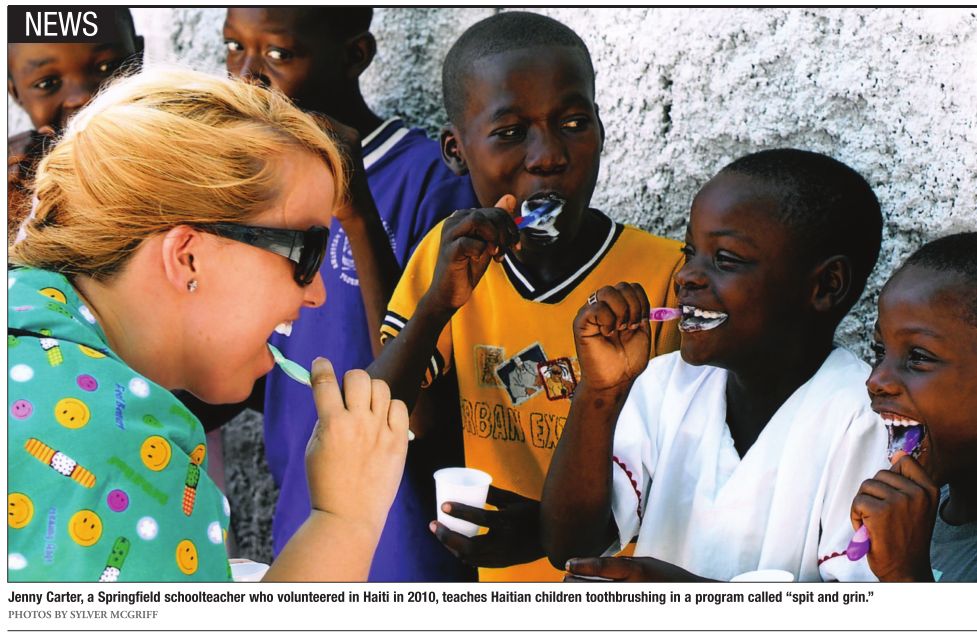
Charity built medical clinic in impoverished nation, but it wasn’t a “forever deal”
CHARITY | Patrick Yeagle
 Dr. H. Brent DeLand of Springfield recalls doing minor surgery while on a humanitarian trip to Haiti in 2002, as his friend and later charity co-founder Greg Richmond of Chicago held a single light bulb aloft for light inside a one-room clinic in the Cité Soleil slum of Port-au-Prince, Haiti.
Dr. H. Brent DeLand of Springfield recalls doing minor surgery while on a humanitarian trip to Haiti in 2002, as his friend and later charity co-founder Greg Richmond of Chicago held a single light bulb aloft for light inside a one-room clinic in the Cité Soleil slum of Port-au-Prince, Haiti.
“I said, ‘Greg, can you please hold the light still?’, and I look up, and he’s swaying back and forth, about to faint from the sight of the blood,” DeLand says with a laugh. It was that trip which prompted DeLand and Richmond to create the Haitian Development Fund (HDF), a Springfield nonprofit supporting the Sarthe Neighborhood Medical Clinic in Cité Soleil, Haiti. The nearly decade-old charity will close its doors at the end of 2011, citing inadequate fundraising and serious health problems facing two board members.
Started in 2002, HDF grew from the twoman operation of DeLand and Richmond together raising $500 per month into a cadre of volunteers and sponsors bringing in more than $131,000 in 2010. The charity sends money, medical equipment and supplies to the clinic, along with volunteers.
Meanwhile, the clinic itself has grown from a one-room, 800-square-foot hovel to a 3,000-square-foot building with a laboratory, an intravenous infusion room, two examination rooms and a staff of 10.
Medical services in Haiti are nearly nonexistent, DeLand says, showing pictures of volunteers treating children with open sores and bulbous tumors. The water is so polluted that clinic staff have to use bottled water to wash wounds instead of drawing from the clinic’s well, downhill from a public latrine.
Though the clinic was mostly destroyed in the January 2010 earthquake that struck Haiti, it was rebuilt to be larger and more sturdy, with rubble from the old clinic used to fill potholes in the neighborhood. DeLand says the clinic has treated 100,000 people.
DeLand, who in his regular job is assistant bureau chief for the Illinois Department of Human Services Bureau of Research and Analysis, says the decision to close HDF came after fundraising proceeds dropped off drastically this year and two of the charity’s board members were diagnosed with terminal illnesses. HDF will donate its remaining assets to the clinic at the end of the year, and the clinic will continue to operate by instituting a small fee for services. HDF will continue to accept donations until September.
DeLand says he’s not upset about closing down HDF.
“We never intended this to be a forever deal, and we have told the clinic staff for the last two or three years to get ready,” he says. “We’ve really put the clinic in a good stead, and I think it’s time for the clinic to be selfsufficient. We’ve given them all the things they need to make this work. Given that this was just a spur-of-the-moment decision to try to do something, it became a significant accomplishment.”
DeLand and his family will make one final trip to Haiti in November to volunteer at the clinic and hand-deliver a microscope and other equipment.
“It will be sad in that it’s my last trip, but I’m ready, and I feel at peace with this decision,” DeLand says. “I think it’s time, and I think that we have no reason to feel anything but that we’ve accomplished a great deal.”